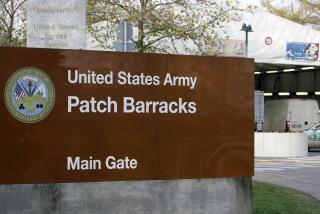U.S. Proposes Air Strikes to Protect Gorazde
- Share via
WASHINGTON — The United States proposed to its European allies Tuesday that the West use stepped-up air strikes--rather than French or British ground troops--to protect the Bosnian “safe area” of Gorazde.
The plan, hammered out during a 90-minute meeting between President Clinton and his top foreign-policy advisers, is designed to counter a French proposal to send 1,000 British and French combat troops to do the job.
The Clinton Administration is fearful that deploying allied combat troops--which would have to be ferried by U.S. military helicopters--would expose U.S. pilots to excessive risk and might not be effective in halting attacks by rebel Bosnian Serbs.
The Administration sent two top officials to Paris on Tuesday to propose the plan to the French. In Washington, Secretary of State Warren Christopher outlined its elements to visiting British Foreign Secretary Malcolm Rifkind.
There was no immediate indication whether London and Paris will go along with the Administration’s proposal. Officials said that Clinton will telephone British Prime Minister John Major and French President Jacques Chirac.
White House officials hope that the proposal will provide the catalyst for allied unity over what to do next to protect Gorazde from Bosnian Serb attack following the recent assault on two other protected enclaves, Srebrenica and Zepa.
The French have challenged Britain and the United States to join in defending Gorazde, but the allies have been split over how to go about it.
Besides the United States, which is reluctant to place its troops at undue risk, Britain believes that it would be unwise for the allies to take any steps that might make them appear to be combatants rather than peacekeepers.
Britain has called a meeting of allied foreign ministers and defense ministers in London on Friday, with expectations that the three powers might be able to come to some agreement on how to defend Gorazde.
But the split has threatened to paralyze the three governments. U.S. officials already have hinted that Washington would be reluctant to take part in such a session if a compromise cannot be found.
American officials said they still had not worked out details of the U.S. plan, but they said the air strikes would be much more deadly than previous attempts and that North Atlantic Treaty Organization pilots would be free to fire when they were in danger.
The Administration already has received warnings from Congress that lawmakers might try to block any use of U.S. military helicopters to ferry British or French troops deployed to defend Gorazde or other enclaves.
On Tuesday, Rep. Lee H. Hamilton (D-Ind.), the ranking Democrat on the House International Affairs Committee and a key ally of Clinton’s, expressed strong reservations about any such move.
The developments came as the Senate, defying warnings from the President, began debate on a resolution by Majority Leader Bob Dole (R-Kan.) that would end U.S. participation in the U.N. arms embargo that prevents the Bosnian Muslim government from obtaining the weapons it needs to defend itself against the better-armed Bosnian Serb rebels.
The action, which marked a clear setback for the Administration, came despite assertions by top officials that lifting the embargo unilaterally would force the allies to pull their U.N. peacekeeping forces out of Bosnia-Herzegovina.
The Administration is afraid that if the effort to bolster the U.N. forces does not succeed, France and Britain will order the withdrawal of their peacekeeping units, forcing the United States to send ground troops to help evacuate them.
Clinton already has pledged to deploy as many as 25,000 ground troops as part of a NATO-led 80,000-strong contingent that would bring out the U.N. peacekeepers and recover their equipment. The move is unpopular, however, in Congress.
Earlier Tuesday, Christopher, Defense Secretary William J. Perry and Gen. John M. Shalikashvili, chairman of the Joint Chiefs of Staff, made a last-ditch attempt to delay the measure, meeting with Republicans and Democrats.
The Dole measure is considered almost certain to pass. Congressional strategists said the only question is whether sponsors can muster enough votes to override a presidential veto.
The Administration has been trying to persuade its allies to reinforce U.N. peacekeeping troops, both by stepping up NATO air strikes against the Bosnian Serbs and by deploying the European rapid-reaction force created to do the job.
The 12,500-member rapid-reaction force, made up of French, British and Dutch troops, is essentially in place in neighboring Croatia, but some of its weapons and equipment are still in transit.
Times staff writers Michael Ross in Washington and William Tuohy in London contributed to this article.
More to Read
Sign up for Essential California
The most important California stories and recommendations in your inbox every morning.
You may occasionally receive promotional content from the Los Angeles Times.














